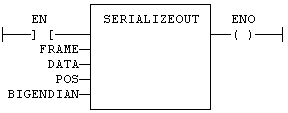
Function - Copy the value of a variable to a binary frame
FRAME :
USINT Destination buffer - must be an array
DATA :
ANY(*) Source
variable to be copied
POS :
DINT Position in the destination buffer
BIGENDIAN : BOOL
TRUE if the frame is encoded with Big
Endian format
(*) DATA cannot be a STRING
NEXTPOS : DINT Position in the destination buffer after the copied
data
0 in case or error (invalid position /
buffer size)
This function is commonly used for building a communication frame in binary format.
In LD language, the operation is executed only if the input rung (EN) is TRUE. The output rung (ENO) keeps the same value as the input rung. This function is not available in IL language.
The FRAME input must be an array large enough to receive the data. If the data cannot be safely copied to the destination buffer, the function returns 0.
The function copies the following number of bytes to the destination frame:
1 byte for BOOL, SINT, USINT and BYTE variables
2 bytes for INT, UINT and WORD variables
4 bytes for DINT, UDINT, DWORD and REAL variables
8 bytes for LINT and LREAL variables
The function cannot be used to serialize STRING variables.
The function returns the position in the destination frame, after the copied data. Thus the return value can be used as a position for the next serialization.
Q := SERIALIZEOUT (FRAME, DATA, POS, BIGENDIAN);

(* The function is executed only if EN is
TRUE *)
(* ENO keeps the same value as EN *)

Not available